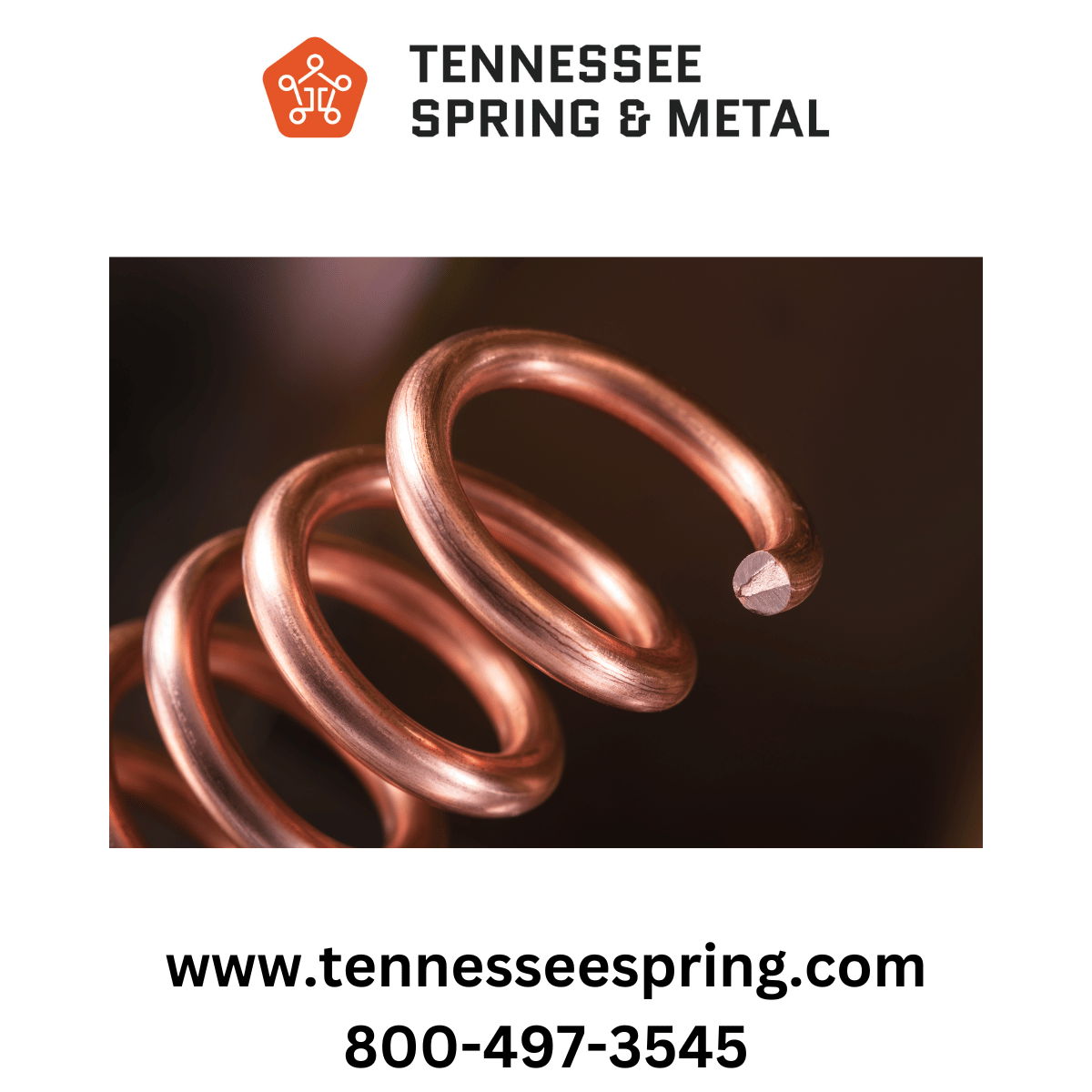Benefits of Alloy Wire Springs
Alloy Wire Springs Made in America
You know we’re pretty sprung about springs (and metal) around here. As with any industry, trends change and spring requirements flex and bend with the times. Lately, we’ve noticed an increased interest in springs made from alloy wire.
Lucky for you, Tennessee Spring & Metal makes high-quality springs out of just about any alloy you can imagine.
Here’s a not-so-shortlist of alloy wire we use to make alloy metal springs for our customers.
Spring Steel & High Carbon Steel
Stainless Alloys
Non-Ferrous Metals
Copper Alloys, including Beryllium-Copper
Bronze Alloys, including Phosphor Bronze
Elgiloy®
Hastelloy®
Monel®
Iconel®
Gold & Titanium
Low Carbon Steel, Annealed
Low Carbon Steel, Hard Drawn
High Carbon Steel, Oil Tempered
Blue-Tempered Steel
Chrome Silicon, Oil Tempered
Chrome Vanadium, Oil Tempered
Beryllium Copper
Elgiloy®*
Hastelloy
Inconel 600, 718 & X750
Phosphor Bronze
Brass
Stainless Steel, Series 300
Stainless Steel, Series 400
Stainless Steel, Type 17-7
The Hidden Power Of Alloy Springs
Springs are the unheralded and unsung heroes of the manufacturing world. Springs – yes, even alloy springs – are versatile devices that store and release energy.
Traditional steel springs have been widely used for centuries, (don’t miss our nail-biter, “A Brief History of Steel Springs”) but the evolution of materials science has opened up a whole new world of spring manufacturing.
Alloy wire springs take spring performance and durability to the next level. In this blog, we will delve into the world of alloy wire springs, exploring their composition, advantages, applications, and significance in modern engineering.
Composition and Characteristics of Alloy Wire Springs
Alloy wire springs are crafted from specially engineered materials, combining the best properties of different metals to achieve optimal performance. These alloys often include elements like nickel, chromium, titanium, and cobalt, which, when combined in precise proportions, result in exceptional mechanical, thermal, and corrosion-resistant properties.
Alloy Wire Springs Are Notable For …
Strength: Alloy wire springs exhibit higher tensile strength compared to traditional steel springs, allowing them to withstand greater forces without deformation.
Durability: The unique composition of alloy wire springs enhances their resistance to fatigue, ensuring a longer service life even under repeated stress cycles.
Corrosion Resistance: Many alloy wire springs are designed to resist corrosion, making them suitable for harsh environments where traditional springs might deteriorate.
Temperature Stability: Some alloy wire springs maintain their performance across a wide range of temperatures, allowing them to be used in both extreme hot and cold conditions. So, you know, like anywhere in Tennessee (and beyond, of course)!
Advantages of Alloy Wire Springs
Precision Engineering: Alloy wire springs can be manufactured with precise tolerances, ensuring consistent performance and reducing variations in spring constants.
Reduced Weight: Their higher strength-to-weight ratio allows engineers to design lighter systems without compromising on functionality.
Compact Design: Alloy wire springs can store more energy in a smaller space, making them ideal for applications with limited space constraints.
Customization: These springs can be tailored to meet specific requirements, such as load capacity, deflection, and spring rate, catering to a wide range of applications.
Uses for Alloy Wire Springs
The versatility and enhanced properties of alloy wire springs have led to their widespread adoption in various industries:
Aerospace: Alloy wire springs find use in aircraft landing gear systems, providing consistent and reliable performance in high-stress conditions.
Automotive: These springs are employed in suspension systems, ensuring smooth rides and improved vehicle handling.
Medical Devices: Alloy wire springs are used in medical implants and devices due to their biocompatibility and resistance to bodily fluids. Speaking of bodily fluids, you won’t want to miss “10 Surprising Reasons Why Metal Springs are Lifesavers in the Medical Equipment Industry.”
Industrial Machinery: They are used in machinery components such as valves, actuators, and clamps, contributing to the overall efficiency and reliability of industrial processes.
Electronics: Alloy wire springs are utilized in electronic connectors, ensuring reliable electrical connections and maintaining signal integrity.
Ready to ally with alloys? Contact Tennessee Spring and Metal online or call us at 1-800-497-3545.
Tennessee Spring and Metal is AS9100 Rev D, ISO 9001:2015 certified.

